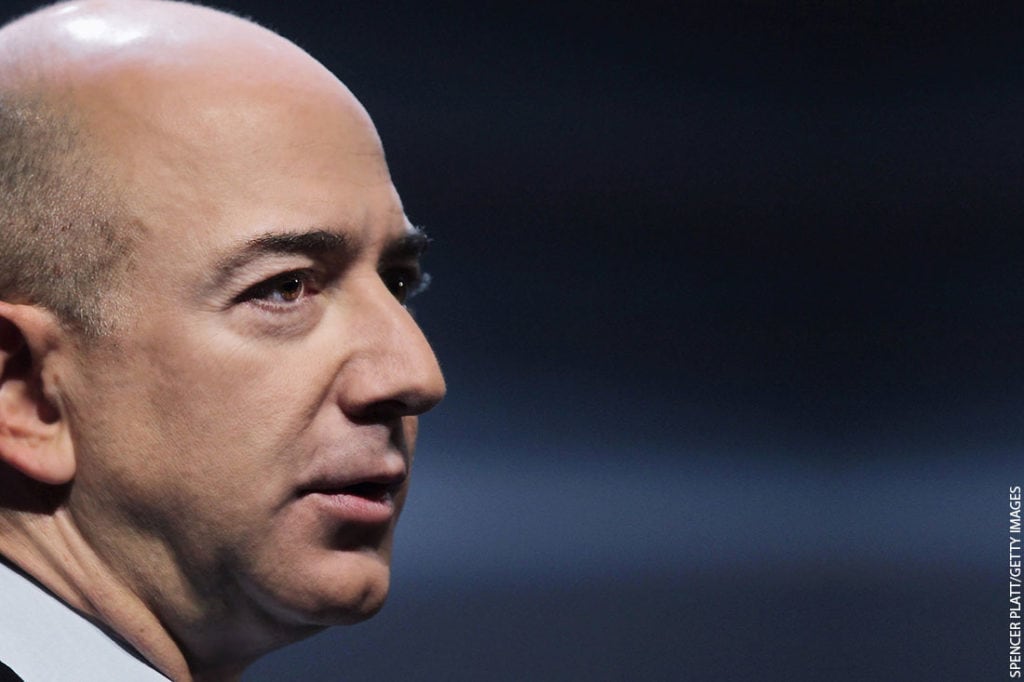The first 60 Minutes profile of Jeff Bezos has not aged well.
In the 1999 feature segment, preserved on YouTube, the venerable news show pokes fun at his nerdy tendencies. It wonders whether his company can win a war against traditional brick and mortar powers and scoffs at his frugality.
In one telling scene, a 35-year-old Bezos sits in a poorly lit office behind a light-colored desk constructed from a door propped up by two-by-fours. The office is cluttered with stacks of papers and books. The carpet is stained and littered. A yellow rubber duck sits atop a massive gray computer monitor. To his right, hanging lopsided on the wall, is a white sign with “amazon.com” spray-painted in blue.
The video spreads through social media feeds every so often, usually in sync with news of Bezos’ ever-increasing personal fortune or Amazon’s latest retail take-over. Users pair it with inspirational messages for startup hopefuls and self-proclaimed nerds everywhere.
“Remember, everyone starts somewhere!”
“This is Jeff Bezos selling books out of his garage. Now he’s a multi-billionaire. Never give up!!”
“When you want to quit, remember that Amazon wasn’t always a monster company.”
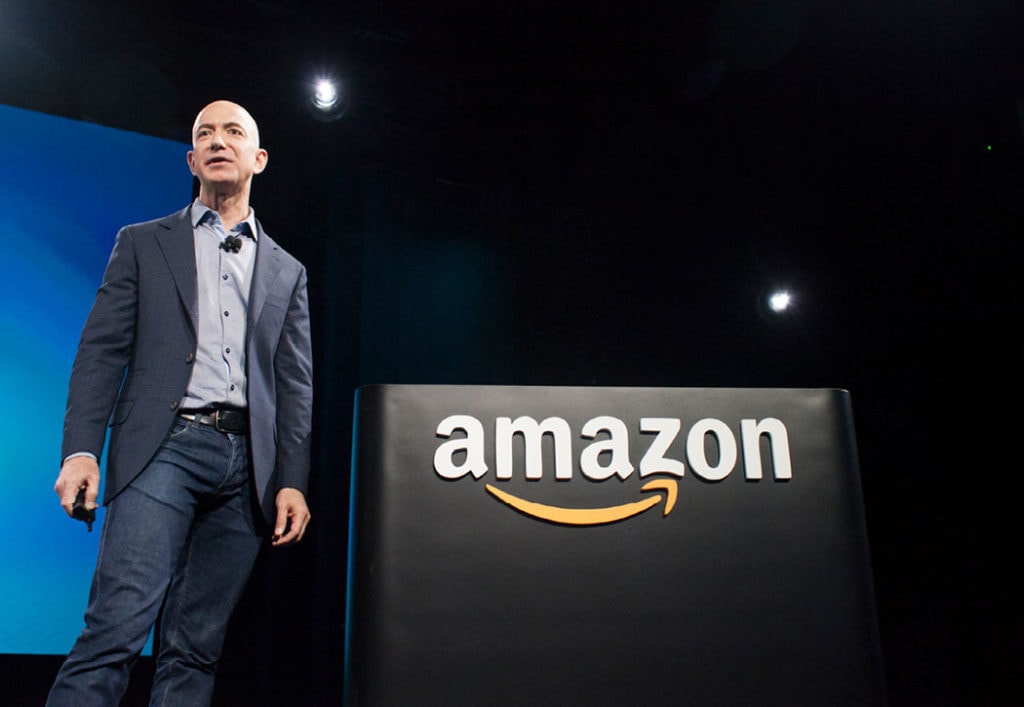 DAVID RYDER/GETTY IMAGES
DAVID RYDER/GETTY IMAGES
In fact, Amazon was well on its way to behemoth status by the time he was interviewed by CBS’s Bob Simon. Amazon had been a publicly traded company for two years, with Bezos holding roughly $10 billion in its shares. The company had moved from a Bellevue, Washington garage to its current Seattle headquarters years prior. But Bezos was notoriously thrifty and doors were cheaper than traditional desks. (Frugality is one of the 14 leadership principles listed on the Amazon website.) Today, the company still uses door desks, and gives miniature versions, signed by Bezos, as awards for cost-cutting innovations. The rundown office was more a purposeful symbol than financial necessity—a recurring theme of Bezos’ leadership style.
That style, characterized by an aggressive and unrelenting focus on the long-term, hasn’t changed.
In a digital age when flash-in-the-pan technology is the standard and innovation is mandatory for survival, Bezos’ commitment to consistent, clear and simple guiding principles is perhaps the most rebellious act against conventional business.
The founder of a little online bookstore and one of the four horsemen of the Internet believes in the matte gray of long-term business, customer focus and innovation. His actions continue to support those beliefs. That same company—now with a stock market value of more than $700 billion—was built on a set of principles written by a guy who used to eat an entire can of refrigerated biscuits with butter every morning and who almost named his company MakeItSo.com, after a frequent Star Trek command. (He actually registered the name “Cadabra Inc.” until business associates told him it sounded too much like “cadaver.”)
Bezos doesn’t want the watery rags-to-riches story to persist. In The Everything Store: Jeff Bezos and the Age of Amazon—perhaps the most intimate profile of Bezos to date—author Brad Stone begins the prologue by meeting the no-nonsense CEO, book proposal in hand. Bezos’ biggest concern was narrative fallacy, a relatively new term that describes how humans oversimplify complex stories to make them more appealing and manageable.
“When a company comes up with an idea, it’s a messy process,” Bezos told Stone. “There’s no aha moment.”
Sure, the Amazon story is the perfect kind of tale that will line newsfeed walls for generations to come. But that venture was just the beginning. Ultimately it was an unwavering dedication to a set of beliefs that allowed Bezos to withstand the dot-com bust and eventually foray into related and distinctly unrelated markets including cloud storage, media, healthcare, space exploration and beyond. His success in those varied markets make him a multi-faceted powerhouse, sharing a virtual home with 64 million Amazon Prime users and gaining invaluable insight into their likes and dislikes, their fears and guilty pleasures, their political leanings. The world has invited Bezos into their homes and entrusted to him their futures. He’s not leaving anytime soon.
“When a company comes up with an idea, it’s a messy process, there’s no aha moment.”
* * *
Just as it’s now nearly impossible to imagine a world without one-click purchasing and same-day delivery, it’s even more difficult to write about Bezos without regurgitating The Amazon Story. They are two halves of a whole. A right and left hand that together form a reality we once never thought possible and now cannot imagine living without. This, the slow but steady slide into our daily routine, is the genius of Bezos, and it’s rocketed him to the distinction of Richest Person in History, a throne that is situated under a microscope.
Depending on the decade, Bezos is either a hero or a villain. His first brainchild has been compared to Sears’ revolutionary idea of mail-order catalogs. He’s been revered as the savior of a broken economy, supplying jobs to 542,000 people worldwide and growing. He’s also been under fire for tax avoidance and entering the media industry not for any dreams of journalistic preservation, but to further his consumer empire and political agenda.
Some of the suspicions hold water. Amazon reportedly paid only 13 percent of its profits in taxes between 2007 and 2015. The average tax rate for the S&P 500 was 27 percent. And increased automation in the Amazon warehouses could eventually mean thousands of layoffs. But Bezos remains unfettered by the ebb and flow of his likeability. Just as he refuses to calculate business success based on quarterly market results, he also mostly refuses to respond to flavor-of-the-week criticism. The 54-year-old has never really cared what people think; he’s only looking at the data, which almost like a video game with predetermined levels, has paved the way to unimaginable success.
* * *
When he was a sixth-grader in a Houston school for gifted children, Bezos charted a graph of the teachers’ individual performances throughout the school year based on student surveys. At age 10, he calculated that his grandmother, a smoker, had already shaved off nine years of her life through a per-puff equation. When he proudly informed her of his results, she burst into tears. Bezos’ often obsessively analytical nature was impressive but not always endearing.
Stories of his geeky bravado abound: from dismantling his crib as a toddler to creating an alarm system on his bedroom door to protect against unwanted sibling intrusions. When it came to early computers, he was fascinated not only by the complexity, but the sheer possibility. In 1990 he leveraged that fascination into a promising career as the youngest vice president of a Wall Street financial firm. His job: Spearhead a team to design and apply complex algorithms to predict financial market fluctuations.
His affinity for numbers wasn’t just useful in the office. Bezos once calculated how many more women he could meet through a local ballroom dance class than through more traditional means. He was a self-proclaimed professional blind-dater, often gleaning valuable insight from otherwise failed dates.
“I wanted a woman who could get me out of a third-world prison,” Bezos said in a rare candid interview with his brother, Mark, at the 2017 Business Insider Summit LA. Resourcefulness was his main objective, in both business and life. Once he met his wife, Mackenzie, at the finance firm in 1992, the pair only dated for three months and married within six. The next calculation would change his life.
He called it “the regret-minimization framework.” While deciding whether to launch a business in the risky but fastest-growing industry—the Internet—he weighed his options from the perspective of his 80-year-old self. The regret of losing out on a world-altering venture, he decided, was much more potent than leaving a well-paying corporate job in New York City. Together with his new wife, and armed with nearly all of his parents’ life savings, Bezos drove west in a modern-day gold rush. Amazon.com was born.
* * *
Today Bezos fits an increasingly mainstream mold of Trekkie-turned-billionaire-turned-Trekkie. In 2000 he secretly launched his most personally meaningful endeavor: Blue Origin, a privately funded aerospace manufacturer and spaceflight services company founded two years before Elon Musk started SpaceX. Only in 2003, when questions of mass land purchases in Texas were raised, did Blue Origin appear on the public radar.
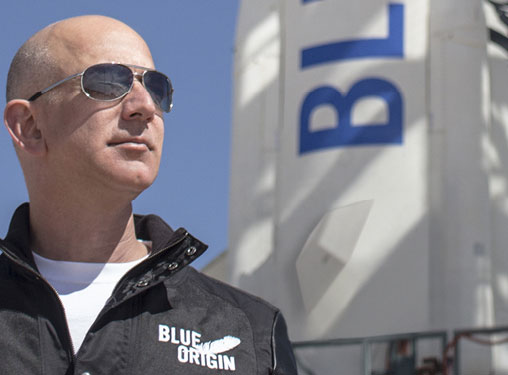 COURTESY OF BLUE ORIGIN
COURTESY OF BLUE ORIGIN
Now the socialite leader tweets high-res videos of reusable rocket launches at Blue Origin’s test site in West Texas, walks the red carpet with Oscar winners and hosts lavish annual futurism conferences where complimentary Patagonia jackets and charcuterie spreads await guests in plush Los Angeles hotel rooms. But back in the early days, it was all work and no play.
According to Stone, the Amazon headquarters in Seattle doesn’t have free snacks, free parking or happy hours. Employees pay for coffee, but as an added bonus, can participate in a punch card program—every 10th coffee is free. Bezos is known for publicly gifting his completed punch cards to employees in line. Executives fly coach and are required to pay for their own upgrades.
“Accomplish more with less. Constraints breed resourcefulness, self-sufficiency and invention,” Bezos used to say. His quotes became known as “Jeffisms.”
Admittedly, Bezos has become the icon of efficiency and “head down, work hard” mentality, but at a cost. For a company built upon the sparkling, do-good mountain of customer service, not much was known about its employees until a 2015 exposé of the Amazon work culture was published in The New York Times.
The article outlined taxing working conditions including an Arizona warehouse without air conditioning where ambulances were parked on call outside the doors as employees “dropped” in the heat. Cooling units were later installed.
In the creative and innovation departments, people were encouraged to question and critique each other’s ideas, which sounds collaborative but often resulted in personal attacks, as several former employees detailed to Stone. PowerPoint presentations were banned in favor of six-page narratives. Engineers rebuked the idea of explaining a spreadsheet or complex algorithm in narrative form, but Bezos believes that people “can hide between bullet points.” Explaining an idea in paragraph form spurs problem-solving and creative thinking, he’s suggested.
Although not an official company policy, employees told the Times that they were expected to work 60- to 80-hour workweeks and answer their phone and email over the weekends and on vacation.
Perhaps the most damaging aspect of the Times piece targeted Bezos himself. He’s known, according to more than 100 interviewees, for possessing little patience for sloppy work or ineptitude, however incidental.
“Amazon is where overachievers go to feel bad about themselves,” Noelle Barnes, who worked in marketing at the company for nine years, told the Times.
Bezos responded to the allegations with a company-wide letter encouraging employees to read the article and address any current issues with human resources.
“[The article] claims that our intentional approach is to create a soulless, dystopian workplace where no fun is had and no laughter heard.” he wrote. “Again, I don’t recognize this Amazon and I very much hope you don’t, either.”
As several employees admitted to Stone, Bezos was often correct in his harshly delivered critiques. One employee noted the CEO “was incredibly intelligent about things he had nothing to do with.”
* * *
For the past two decades, Bezos has lived by a set of rules. The notable three are: customer first, innovation always and long-term over short-term. But unlike the hyperbole of big business, Bezos walks the talk, consistently. He still encourages customers to email [email protected] if they have a complaint. “Jeffisms” exist because Bezos reinforces his principles often. He might be known as an irritable, demanding, aggravatingly frugal leader, but his steady vision and message offer an environment of honesty and consistency rarely visible in most of corporate America.
In 2010, Bezos nearly shut down an email marketing team after hearing from a customer who viewed but didn’t purchase lubricants, then received an embarrassing follow-up email urging them to complete the purchase. Those nudging emails had been responsible for hundreds of millions of dollars in annual revenue for Amazon. Bezos’ unwavering dedication to customer service has granted Amazon an unmatchable relationship to its client base. It can never be compromised.
Underneath this set of guidelines is a recurring theme that conventionalism is the death of everything: business, wealth, innovation, creativity. The world welcomes Amazon because it’s different. To continue battling conventional thinking, Bezos must strike a sensitive balance between adaption and individualism. Perhaps most persistent and challenging is Amazon’s paradoxical problem: People love to love local mom-and-pop shops, though they can’t always afford to support them on a regular basis. People want the low prices and seemingly endless inventory that a large-scale retailer like Amazon can provide, but they want to feel good about it, too.
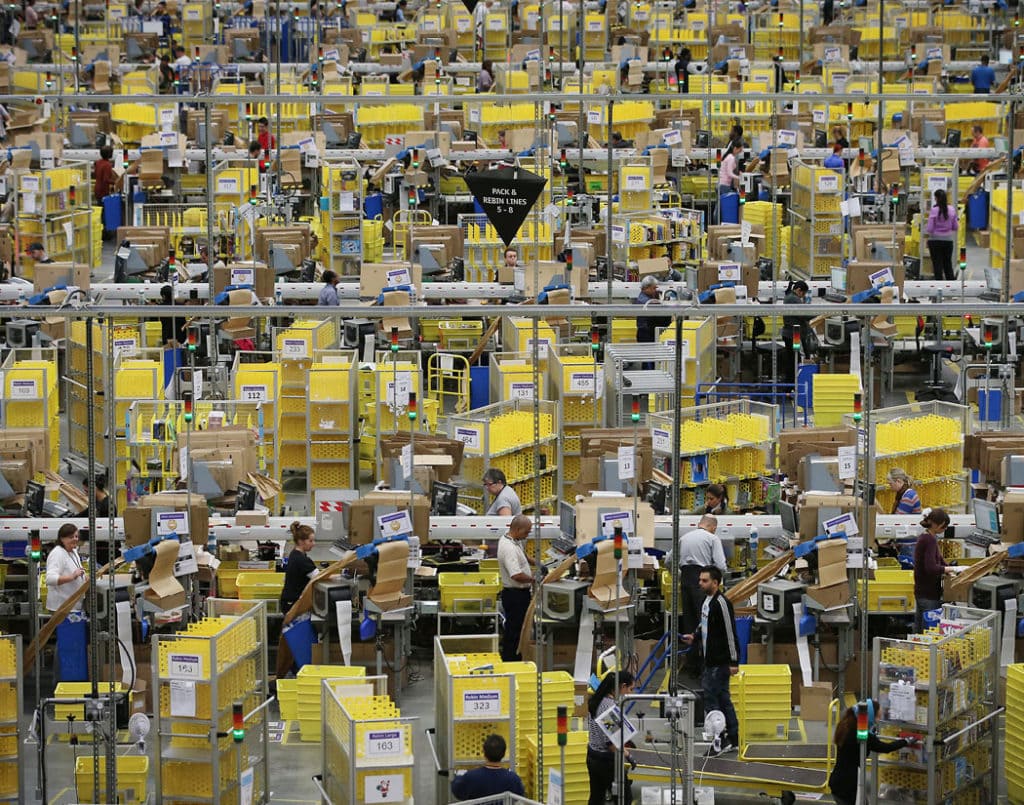 PETER MACDIARMID/GETTY IMAGES
PETER MACDIARMID/GETTY IMAGES
When Amazon launched a price-comparison app, critics were outraged, accusing Amazon of siphoning customers from local businesses. Bezos sent out a company-wide memo grappling with the question about how a company is perceived. In it, he created a list of characteristics detailing why some companies are beloved, despite PR blunders, while others will always be viewed as greedy, careless machines. The list included things such as, “explorers are cool.” And “capturing all the value only for the company is not cool.” His conclusion bolstered a commitment to those guiding principles created more than two decades ago.
“It is not enough to be inventive—that pioneering spirit must also come across and be perceivable by the customer base,” he wrote.
Bezos, then, must be both a missionary and a mercenary. He must consider the effect of every decision on the consumer, aiming to protect that precious relationship at all costs. But that’s not enough. He must also be a confident but not ruthless competitor. He must be determined to grow without annihilating those who obstruct his path.
What might be an impossible task for most is one that Bezos seems born to tackle.
* * *
In a business world that focuses on short-term profits and the next shiny object, Bezos is a pillar of unchanging philosophy, as outlined in 1997 in his first letter to shareholders.
“Because of our emphasis on the long term, we may make decisions and weigh tradeoffs differently than some companies. Accordingly, we want to share with you our fundamental management and decision-making approach so that you, our shareholders, may confirm that it is consistent with your investment philosophy…
“We aren’t so bold as to claim that the above is the ‘right’ investment philosophy, but it’s ours, and we would be remiss if we weren’t clear in the approach we have taken and will continue to take.”
The full 1997 letter is reprinted and distributed in conjunction with each new year’s letter. Despite the fact that Amazon hasn’t shown a profit on paper in 13 of its 21 years and amid growing scrutiny of big tech for unauthorized personal data collection, his company remains one of the largest economic forces and attractive investment options.
When will Bezos slow expansion in favor of healthy profits and dividends? If the last two decades are any indication, that time is still in the far-flung future.
In the early post-garage days, Bezos told employees that he not only wanted to sell books about kayaking, but that he wanted to sell kayaks, subscriptions to kayaking magazines and reservations for kayaking trips. Total domination, it seems, was always the goal.
Bezos has adapted that aggressive growth strategy—starting with the customer and working backward—into each new market. In 2013, he purchased a hemorrhaging Washington Post for $250 million. Although not editorially involved, his trademark influence can be felt in aggressive initiatives to shorten web page load times and expand subscription efforts. In the past two years, subscriptions have doubled and nearly halfway through its third profitable year, the Post continues to hire journalists in an industry rife with budget cuts.
“The term gifted was new,” his mother, Jackie, told Stone. “I knew he was precocious and determined and incredibly focused, and you follow that through to now and see that it hasn’t changed.”
Almost with a prescient notion of the future, Bezos continues to be in the right place at the right time. As an early investor in Google, he seemed to understand the key players in the digital age. He hired some of the smartest minds in engineering to experiment in artificial intelligence before it was mainstream. That’s how Alexa was born. The AI assistant of the Amazon Echo is now present in more than 40 percent of U.S. homes. In late January, a joint press release from Amazon, Berkshire Hathaway and JPMorgan Chase announced a partnered entrance into the healthcare industry for their U.S. employees. Bezos, it seems, has his hands in every aspect of American life.
A symbolic display of his future focus, Bezos is the largest financial backer of the Long Now Foundation, a San Francisco nonprofit that seeks to promote sustainability and “slower/better” thinking over the more common “faster/cheaper” public mindset. A symbol of the organization’s mission, a giant clock under construction on his property in West Texas, is being built to last 10,000 years. The hand moves only once per year.
* * *
AdVenture Capitalist is a free-to-play video game for smartphones. Its first level directs the player to open a lemonade stand. Tap the progress bar to squeeze lemonade; the faster you click, the more lemonade you sell. With the revenue, you can purchase various upgrades and hire managers to run the lemonade stand while you’re away. Do this long enough, and you’ll have enough money to launch a pizza shop, an auto repair shop and so on until, enough levels in, you achieve world domination. Basically. But the game doesn’t stop there. The more you invest in your own growth, the faster you grow. With enough money, you can purchase “Mars bucks,” which will then fuel your progress toward… colonizing Mars.
Sound familiar?
It seems Bezos was always looking toward the stars. When he was 5, he watched Neil Armstrong walk on the moon with his grandfather, “Pop,” a former regional director of the U.S. Atomic Energy Commission. In high school, with then-girlfriend Ursula “Uschi” Werner, Bezos launched a summer camp for fourth, fifth and sixth graders. Six students—two of which were Bezos’ siblings—signed up for the 10-day, $150 camp. The DREAM Institute, which relied on a mixture of science and literature, taught the students about fossil fuels, space colonies and interstellar travel. After years of talks with Paramount Pictures, Bezos made a cameo in 2016 as an alien Starfleet official in Star Trek Beyond. He even began working out every morning to prepare himself physically for space travel, presumably following the demise of the daily biscuit diet.
“You don’t choose your passions; your passions choose you,” he told the crowd at Summit LA. “How they’re formed, you’re not completely sure. But I do think you get imprinted somehow early on with certain things, you just get excited about them. Because you’re excited, you pay more attention to them, and they grow. Space is like that for me.”
In 2015, Bezos and Blue Origin made history with the inaugural test flight of New Shepard, a rocket named after Alan Shepard, the first American in space. On April 29 of that year, the reusable rocket successfully breached Earth’s atmosphere, returned and landed vertically. The historical first gives weight to Bezos’ plans for not only space exploration, but colonization.
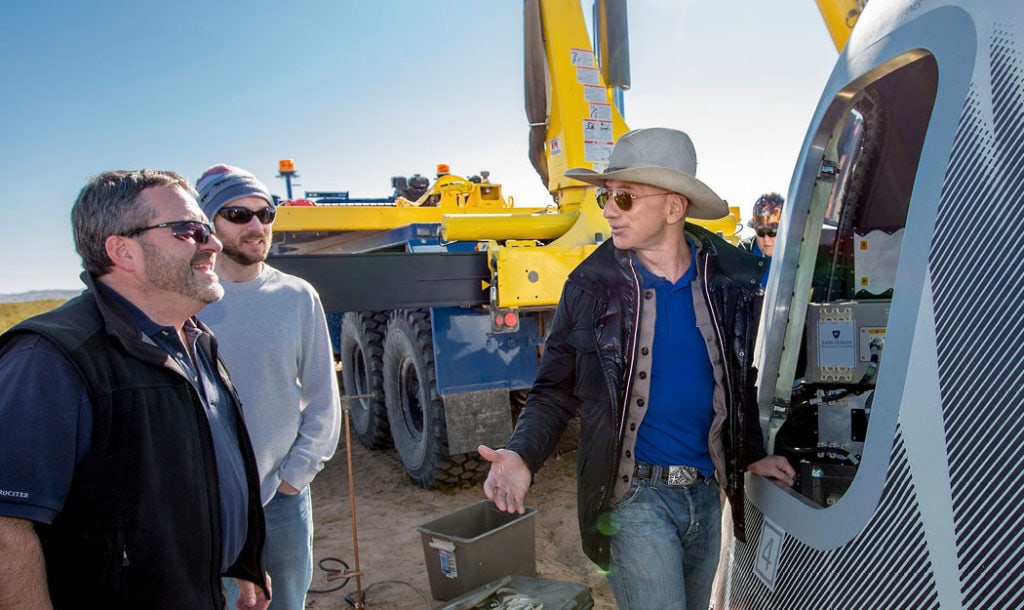 COURTESY OF BLUE ORIGIN
COURTESY OF BLUE ORIGIN
His space-race competitor, Musk, was quick to point out on Twitter that breaching the atmosphere is distinctly different than a suborbital mission with a successful vertical landing. Bezos’ New Shepard won that race just a few months later. A second reusable rocket with the same name was since sent on five subsequently successful suborbital missions before retiring.
Although media is seldom-allowed in the Blue Origin headquarters in Kent, Washington, visitors describe it as a Walt Disney-like childhood dream-turned-reality. A full-scale model of a Jules Verne-inspired Victorian-era spaceship sits in the atrium of the building, complete with velvet-covered seats and brass controls. The company has a coat of arms and a Latin motto, Gradatim Ferociter, which translates to “Step by Step, Ferociously.” It’s a phrase applicable to every facet of Bezos’ life and ventures, but very aptly affixed to his biggest passion.
Since 2016, Blue Origin’s annual spending is estimated around $1 billion, which is funded through sales of Bezos’ Amazon shares. If you spoke to Werner, she would tell you that this was always the plan. In 2003, when asked what else Bezos—already one of the wealthiest people in the world at the time—could possibly want in life, she joked that he is amassing a fortune large enough to build his own space station.
“I have realized about myself that I’m very motivated by people counting on me.”
Bezos has long been a supporter of space colonization, not just travel. In part, he believes it’s necessary to save humankind from the effects of big business, ironically enough. He wants to lead the way.
“I have realized about myself that I’m very motivated by people counting on me,” Bezos once told a reporter. “I like to be counted on.”
His aggressively confident and demanding leadership style hasn’t earned him many friends, but it’s certainly earned him a spot in the history books. To Bezos, Amazon is still a startup. In his most recent letter to shareholders, he wrote “I work in an Amazon building named Day 1, and when I moved buildings, I took the name with me. I spend time thinking about this topic.
“Day 2 is stasis. Followed by irrelevance. Followed by excruciating, painful decline. Followed by death. And that is why it is always Day 1.”
It’s not difficult to imagine that Bezos can conquer whatever goal he sets, no matter the size. His childhood best friend Joshua Weinstein recalled that when Bezos decided he wanted to be valedictorian of his 680-student class, the rest of the students began competing for the No. 2 spot. His determination was rarely questioned.
An 18-year-old Bezos ended his valedictorian speech in what might be described as a self-fulfilling prophecy: “Space is the final frontier. Meet me there.”
This article originally appeared in the Fall 2018 issue of SUCCESS magazine.



